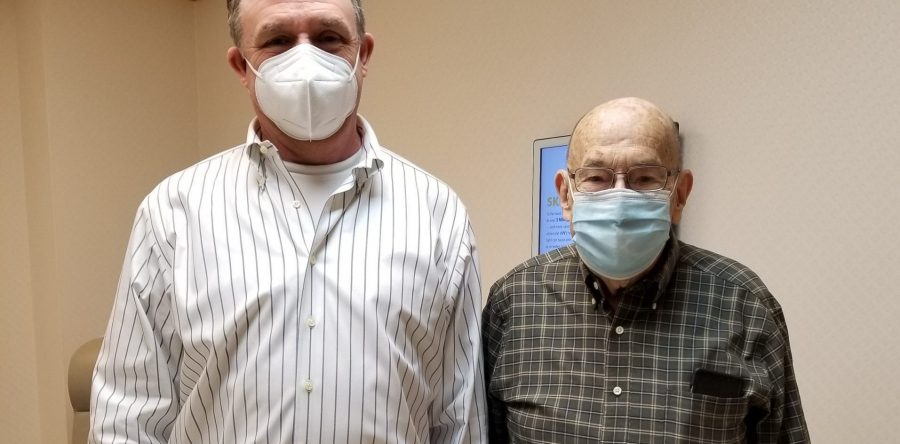For thirteen years, 86-year-old Jim Sickbert has been battling multiple myeloma. That should be enough for one person, however, over that time he also battled skin cancer that metastasized to his lymph node, and a bad case of shingles, all while living his life as normal as he could, and avoiding COVID-19.
The widowed father of three and grandfather to many was first diagnosed in 2008 after experiencing side aches. “I didn’t know what was wrong with me, but my family doctor sent me to see Dr. Mark Fesen at Central Care Cancer Center in Great Bend. Dr. Fesen diagnosed it right away as multiple myeloma. I took a bone marrow test and that’s what it turned out to be, so Dr. Fesen has been treating me since then.”
Treatments the first few months caused Jim to feel a little tired and woozy, but Jim says, “I didn’t change my lifestyle at all. I just kept doing everything I ever did.” And that’s a mantra that he has continued to follow over the years.
Multiple myeloma is a cancer formed by malignant plasma cells. Normal plasma cells are found in the bone marrow and are an important part of the immune system. Plasma cells make the antibodies that help the body attack and kill germs. When plasma cells become cancerous and grow out of control, it’s called multiple myeloma. Although multiple myeloma is incurable, there are many ways to manage the disease.
After a few years of treatment, Dr. Fesen asked Jim if he would want to visit the UAMS Myeloma Center in Little Rock, Arkansas. This is a center for research and clinical care related to multiple myeloma and Jim was willing to be a part of their research. “They would do a battery of tests on me every six months to document any progression or regression of the myeloma due to my treatment. Actually, my myeloma started to go into remission, but it came back. But since I was in their research area, they had a new drug called Darzalex, that was FDA approved and wondered if I would be willing to try it, so I did. The myeloma did kind of go back into remission and that’s what I’ve been taking ever since, under Dr. Fesen’s supervision.” Darzalex is not chemotherapy. It’s a targeted monoclonal antibody that helps slow or stop the progression of multiple myeloma in several ways.
But during this time, in 2017, Jim got a sore on his nose. It was biopsied and turned out to be merkel cell carcinoma. Merkel cell carcinoma is a rare, aggressive skin cancer. It appears as a painless, flesh-colored or bluish-red nodule growing on your skin. Merkel cell is more likely than common skin cancers to spread to other parts of the body and can be very hard to treat if it has spread.
May is National Skin Cancer Awareness Month. Cancers of the skin are by far the most common of all types of cancer. Basal skin cancer is the most common. There is also squamous cell and melanoma, as well as the rare, merkel cell. Any spots on your skin that are new, changing in size, shape, or color should be checked out by your health care professional.
Dr. Fesen referred Jim to see Dr. Thomas Hegarty at Central Care for radiation treatment for the merkel cell cancer. “I was treated, but then it showed up again. Then that disappeared, but it eventually spread to my lymph node in the left side of my neck. I was treated with more radiation and since then, it hasn’t shown up, but that put Dr. Fesen in a quandary as he was treating two types of cancer. So I now take Darzalex for multiple myeloma, and the immunotherapy drug, Keytruda for the merkel cell twice a month.”
Jim also had lost his wife, Connie, in 2017 of congestive heart failure. They had ended up moving to Wichita for care for Connie. Jim lives there now in an independent living home and sees Dr. Fesen at Central Care’s Newton clinic. “Everyone at both clinics are so nice. Actually, it was kind of like going to see family there every two weeks,” says Jim.
As far as battling two cancers, a bad case of shingles last year during a pandemic, and losing his wife, Jim said it wasn’t a typical roller coaster ride of emotions. “When I was diagnosed with multiple myeloma, Connie seemed to take it pretty good. She was always supportive. We just lived our life normal and didn’t change anything really. I still mowed the yard, took care of the house, went camping and traveled with our RV. I just decided when I came home from finding out I had cancer that I was turning it over to God. I said I’ll do whatever is necessary, and I’m going to keep on living my life, and I did. I didn’t change anything. We just kept going just like we had been.”
Now days, Jim continues his treatments at Central Care in Newton, despite having a few back problems. “The worst part of the cancer I think right now, and has been for quite some time, is that multiple myeloma can weaken your bones and destroy the structure of your bones, thus I’m having some back issues.” Jim continues to go to the Myeloma Center in Little Rock. His children take turns driving him there to spend quality time with their dad.
Jim adds, “I didn’t let cancer bother me. I just accepted it and kept on going. Faith is so important, I think. It comes down to faith and support of family and friends. I know I have had lots and lots of prayers. Don’t let cancer have you. You just have cancer. Keep on going.”
###



4 Responses